Traditionally, Den/The Day took one of the first and one of the last [this interview was recorded on August 8, 2016. – Ed.] interviews of the US Ambassador in Ukraine. Moreover the interview room at the US Embassy contained a selection of The Day newspapers. And the conversation began with these words: “Here are the collective works of Geoffrey Pyatt in Den over three years. I realized there’s not a lot new I’m going to be able to tell you. But I’ll try anyway. My favorite one is this one: February 4, 2014, look at the headline.” And the headline went as follows: “Ukraine will sign the Association Agreement. We hope that it will occur under President Yanukovych. And if it does not, I am very confident it will happen under one of his successors.” By the way, promoting Ukraine in Europe has been one of Pyatt’s priorities. The US ambassador was open and thorough in his responses to our questions, including the ones about the United States’ position on Minsk-2 and about his other two priorities. He also explained why one should not bet against a Ukrainian, revealed his impressions about Ukraine as he is leaving it, and spoke about wishes, the realizations of which were thwarted by Putin.
“IT WOULD BE GROSSLY PREMATURE TO SUGGEST THAT NOW IS THE TIME TO WEAKEN SANCTIONS”
Mr. Ambassador, I have heard from Victoria Nuland and other US officials that the current administration has the goal of resolving the conflict in Donbas before the Obama’s term is over. And the question is how does it see the realization of this task?
“I have no idea. It’s entirely in the hands of Vladimir Putin. As Assistant Secretary Nuland has said, as Secretary Kerry has said, we’re going to work as hard as we can with our partners in Germany and France to try to see the implementation of the Minsk agreements, before the end of President Obama’s administration. Implementation of Minsk-2 means all the Russian troops go out; it means Ukraine’s control over the international border is restored; it means all the hostages are released; it means all of the tanks, and BMPs, and GRAD missiles, and mortars, all of these heavy weapons go back.
“The first point of the Minsk agreement was a comprehensive ceasefire, and the Kremlin has not even fulfilled this first condition. It was another very bad weekend. I saw the ATO center saying that one day last week, it was a record for a single day violation of the ceasefire – more people were killed in the month of July, I think 41 is the total, than in any month since last summer.
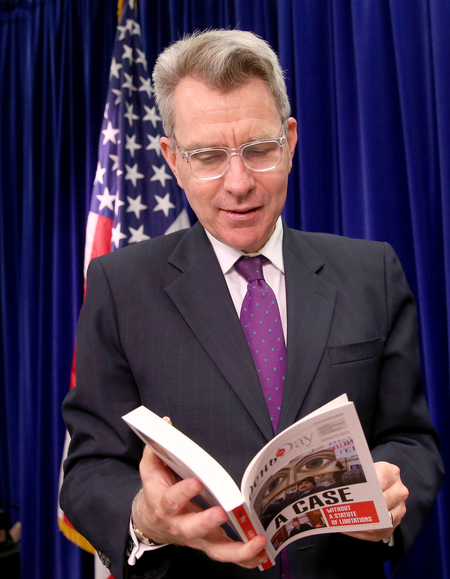
THE AMBASSADOR GRATEFULLY RECEIVED FROM THE DAY A GIFT, AN ENGLISH-LANGUAGE COPY OF THE BOOK A CASE WITHOUT A STATUTE OF LIMITATIONS. HE WILL FIND IT EASIER NOW TO UNDERSTAND THE TRAGIC EVENTS IN RECENT HISTORY OF UKRAINE. DURING HIS FIRST INTERVIEW FOR THE DAY, PYATT WAS PRESENTED WITH AN ENGLISH-LANGUAGE COPY OF THE BOOK UKRAINE INCOGNITA. TOP 25, WHICH DEALS WITH LITTLE-KNOWN PAGES OF UKRAINIAN HISTORY / Photo by Artem SLIPACHUK, The Day
“And as far as the United States is concerned, that is the indispensable first step. And whether or not this first step is achieved, depends entirely on President Putin and the Kremlin. I was in Vienna about a week and a half ago, and your very able Ambassador made a point, that if President Putin was half as committed as President Poroshenko and Ukraine are to peace in Donbas, the Minsk agreements would have been implemented a long time ago.”
In an interview to Der Standard you told that if the current sanctions weren’t having an impact on Russian Federation, they should have been made stronger in order to make that country comply with Minsk agreements. Russia defies Minsk and encourages the separatists to violate it, thus it is evident that the sanctions should be strengthened. But is the United States ready to increase the sanctions unilaterally?
“We have made a policy of what we call ‘maintenance sanctions,’ intended to close loopholes and to keep a clear message to the Kremlin regarding the cost of its territorial aggression. That policy continues, I don’t have any announcements right now in terms of additional sanctions, but it’s very much on the table. And it would be, as I said in Vienna, grossly premature to suggest that now is the time to weaken sanctions.”
“THE IDEA OF NON-NATO ALLY IS A DISTRACTION”
Taking into account the failure of the Budapest Memorandum, according to which the US, the UK, France, Russia, and China were obliged to keep the sovereignty and the territorial integrity of Ukraine, is the United States ready to look at some kind of a bilateral agreement on safety, similar to that between Japan and the United States, in order to protect Ukraine’s sovereignty and territorial integrity?
“I think that’s a question for the next president, whoever she or he is. At this point our focus is achieving the implementation of the Minsk agreements. You raise a reasonable question regarding the Budapest Memorandum, but I think it’s very important to remember, and certainly one thing that I will look back on with pride for my three years here, is the strong record of support the United States has demonstrated for the Ukrainian people during the most difficult times in your country’s history.”
And what about the status of major non-NATO ally for Ukraine, which would increase the country’s opportunities for receiving military aid?
“I’ve always found this to be sort of the wrong question to ask, because Ukraine doesn’t want to be a non-NATO ally. Ukraine wants to be a NATO ally. Ukraine wants to be part of a broader European security community. We have made clear that our policy regarding Ukraine and NATO is unchanged, we have an open door, it’s up to Ukraine, Ukrainian people and the process of reform in this country. I think this idea of non-NATO ally is a distraction. Why would you want to define yourself as what you are not, when what you want is full membership in the European security community?”
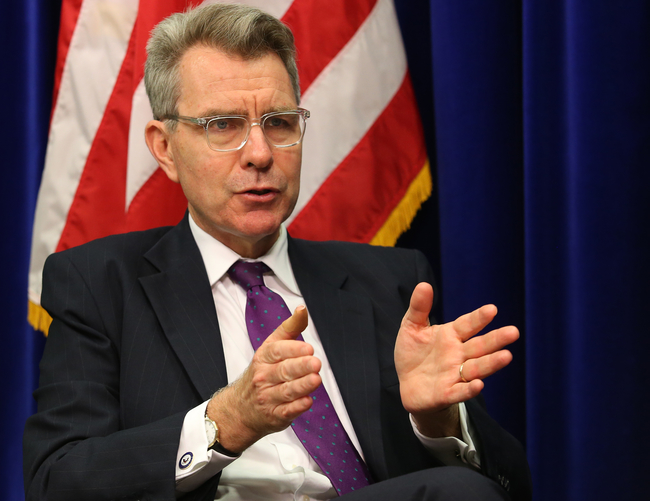
In that case, the United States might give more help, including military aid, as it is doing to Egypt.
“I think that’s a misunderstanding. I mean the quantity and character of our security assistance for Ukraine depends on two things: the policy of the White House, and the resources and support the Congress has provided. I’ve been fortunate during the three years, we’ve had a strong, bi-partisan Republican and Democratic consensus in support of Ukraine. Our security assistance budget from Congress this year is larger than it has ever been. I just don’t think that non-NATO ally is relevant to where we are right now.”
“PUTIN UNDERESTIMATED THE UKRAINIAN PEOPLE”
Indeed, we are very grateful for the help we are receiving from the US. But one question remains open: defensive lethal weapons, the supply of which was agreed upon by the Chamber of Congress. There is a bi-partisan agreement to endorse the supply of this armament, and the amount of it is specified in the Act of Support to Ukraine. Why would President Obama decline to provide this aid to our country, are these Acts not legally binding for him?
“I would look at it two ways. First of all, do not lose track of what we have done. Six hundred million dollars of security assistance. Increasing capacity of that assistance. On the July 4 weekend I was with President Poroshenko, taking delivery of a very large quantity of counter-mortar and counter-battery radars. Two weeks ago we delivered a consignment of UAVs. We have another shipment of night vision goggles coming before long – I think almost a thousand sets. We have done a great deal. And I think that is what the focus should be on. I also place great importance on our training activity, which has had real benefits for Ukrainians, has saved the lives of Ukrainian soldiers.
“On the question of lethal assistance, my government’s conclusion has been that anything that we did in terms of lethal assistance would be overmatched by the Kremlin, and raises the risk of opening a gap with our European allies. And I think that’s most important.
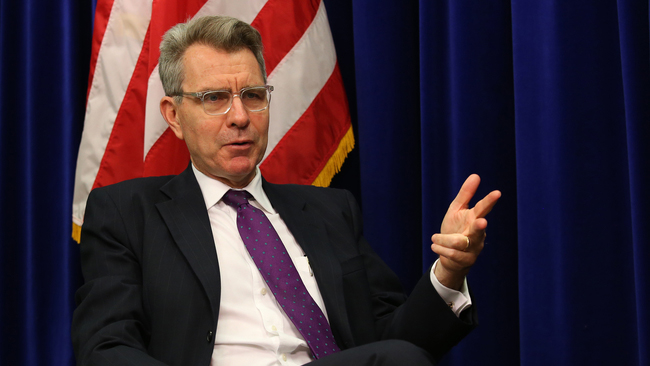
“The Kremlin made a number of mistakes about this conflict. Putin underestimated the Ukrainian people, but another mistake that the Kremlin made was the hope, or the expectation that they could divide NATO, that they could divide the United States and our European allies. And I give a lot of credit to President Obama for the huge amount of time that he personally has spent working with his European counterparts – with Hollande, Merkel, Renzi – to maintain unity on this.”
One of the goals that the United States has in supporting Ukraine is the implementation of reforms in the framework of strengthening Ukraine’s finance, economy, security and independence. Do you see any results here?
“There’ve been obvious results. The most dramatic, I’d like to say the most important reform that nobody knows about, is the reform with the NBU, with the central bank. You have a very professional management team there now, which has a strong support from US Treasury and US Government. They’ve closed more than a third of Ukrainian financial institutions, they made real progress in dealing with the problem of insolvency of related party lending. They’ve built a much stronger banking system as a result. That’s one very clear example. Another one is the energy sector. Corporate governance reform of Naftohaz is historically important. The progress you’ve made on energy self-sufficiency, energy independence, the fact that you’ve bought no gas from Gazprom for the better part of the year now is historically important. And then another one that I’m particularly proud of is the patrol police and the police reform. And I was very proud to join the Chief of Police, Mr. Turchynov, Deputy PM Kubiv, Mayor Klitschko last week for the anniversary of the patrol police. But the most interesting thing for me was on Sofia Square – they’ve put some pictures of new police officers. But what was really encouraging was the ‘before and after’ pictures of what some of these people were doing before. They were dentists, and cooks, and architects, and teachers. These are regular, good, patriotic Ukrainians, who joined the police because they see it as an opportunity to build a new institution.”
Mr. Ambassador, recently you’ve mentioned that Ukrainian oligarchs are losing control over the economy of the country. How can you support this statement?
“First of all, they are much less influential than they once were. They’re not as central to the economy as they once were. You have a whole new sector – through my three years here, there has been an explosion of the Ukrainian technology industry. Almost nobody knows about it, but it’s now the third biggest component of your Gross Domestic Product. There are no oligarchs that I’m aware of who have influence in the IT sector. In fact, all of the IT guys are sort of anti-oligarch. New legislation that has been pushed through, transparency of media ownership, freedom of information – all of these things have the tendency of challenging the business model that the oligarchs had historically used to acquire the wealth and power that they enjoy. They’re still a major factor in the Ukrainian society. As I said in my interview in Vienna, we went through a similar set of challenges in the early 1900s in the United States. But there’s a clear intention from the government, I know from President Poroshenko, to make sure that the rule of law is strengthened in Ukraine in a way that applies equally to everybody, whether their last name is Akhmetov or Savchenko. That’s extremely important.”
“THE ONLY YARD STICK THAT MATTERS IN THIS WAR IS CONVICTIONS”
Every American ambassador, including you, has paid a lot of attention to the reform of judicial system in Ukraine. And they mentioned that it would be very important to resolve the cases forgotten a long time ago, especially the case of Gongadze. Do you think the current Prosecutor General’s Office and the whole judicial system are doing enough to resolve the long forgotten cases in getting rid of the corruption?
“This is a historic task, there are the important first steps that have been taken with the creation of the institutions – the NABU, the anti-corruption prosecutor – which enjoy the support of civil society. I met with your Prosecutor General Yurii Lutsenko just on Friday, we were talking about our support to the PGO. We have a senior Department of Justice official who’s now a retired prosecutor in the United States, who’s now working with Mr. Lutsenko. We talked about this raid on the NABU, and the challenge of ensuring cooperative relations between Ukraine’s different law-enforcement institutions. There’s obviously a lot of work that still needs to be done. I said to Lutsenko the same thing I say almost to everyone in the Ukrainian system – the only yard stick that matters in this war [against corruption. – Ed.] is convictions. It’s not enough to say we’ve launched an investigation, it’s not enough to say we’ve created a task force. What matters is can the prosecutors mobilize the evidence which holds up in court, so that there is no longer impunity. No longer impunity for murders of journalists, whether it’s Gongadze or Sheremet. No longer impunity for those who committed murders on Maidan, no longer impunity for the theft, that has taken place in Ukraine for far too long. Throughout 25 years, the government has been ripped off by the people who used their positions of authority to steal from the Ukrainian people, whether it’s Yanukovych or Stavytsky, or any of the people of that gang, or people who have been involved in corruption more recently. We have the recent positive example of the deputy governor of Mykolaiv, who’s been found with lots and lots of evidence of unexplainable wealth. But the important thing, and this is a job for journalists as well – you put it on the front page one day, and then everybody forgets about it – so a part of the job is to keep the spotlight on these cases, not let these individuals hope that their crimes would just be forgotten.”

“THE IMPORTANT THING IS THE PRINCIPLE, THAT THERE NEEDS TO BE AN END TO IMPUNITY”
You mentioned the impunity of the highest officials. In the interview from February 4, 2014 you answered a question about these high-profile cases. You said that even though you knew about the case, there were many details unknown to you – and you promised to look at them more closely and give a more comprehensive answer next time. In this two and a half years, have you been able to understand the details behind this case? Have you put any effort in speeding up its resolution?
“I don’t want to go into details, because all of these cases are before the courts, before the prosecutors. I’m not going to offer an opinion, whether it’s Sheremet or Gongadze, or any of the Maidan killers. But the important thing is the principle, that there needs to be an end to impunity, that the prosecutors and the courts need to do their work and people need to be held responsible. In the case of Sheremet, we have had FBI agents, crime scene investigators, just like on TV, come here to Ukraine, working with their police counterparts. Our FBI experts, the ones I spoke to, were very impressed by the technical skills of their police counterparts, they were doing good police work looking for evidence, looking for clues. The problem in the Ukrainian rule of law system has not been the absence of technical capacity – it’s absence of political will.”
Experts say that the next IMF tranche might be a problem. If Ukraine doesn’t receive it, hryvnia would devalue again. What is the US position on this matter?
“First of all, we want to see Ukraine fulfill its obligations to the IMF. And I like the way Prime Minister Hroisman puts it. He says: ‘we need to do these reforms not to make the IMF or the US or the EU happy. We need to do these reforms to build a healthy, economically sustainable Ukraine.’ And I think your Prime Minister is exactly right in that regard. Advancing reform is always hard, it’s particularly hard in a Rada like this one, which is so divided. The good news, and it is good news, is that the IMF has confidence in their Ukrainian counterparts. Christine Lagarde has made that clear in her public comments. Your economic situation is healthy. The hryvnia is stable. Your reserves are higher than they have ever been. In fact the central bank is buying dollars in the open market. So, you don’t need this IMF disbursement immediately. There is no reason to panic at all. But these reforms do need to happen, and as I said, they need to happen not to satisfy the IMF, they need to happen for the good of Ukraine. And I cannot do any better in this regard than your Prime Minister.”
How did Ukraine use that 2 billion loan guarantee from the US?
“Right, we have disbursed two billion dollars loan guarantees; we have a third one which is in the pipeline. I signed the paperwork on that with President Poroshenko, and it will be disbursed as soon as the IMF conditionality is accomplished. The first and the most important of those loan guarantees was the first one, because that was a vote of confidence in Ukrainian people in 2014, at a moment when your economy was under siege. And I was just meeting earlier today with one of my political friends, and he was expressing concern about all the challenges that lie ahead. But I made a point to him: look, Ukraine survived 2014, you survived the Russian invasion, you survived the collapse of your economic and financial situations, your resources were essentially zero, you survived an incredible dislocation, when Russia cut of your historic economic ties, and you survived the Kremlin’s effort to divide Ukraine, to turn a Ukrainian against a Ukrainian. Having survived all of that, I am completely confident that Ukraine will be able to overcome whatever challenges lie ahead in 2016 and 2017. This is all manageable.”
“UKRAINIANS SHOULD BE ENORMOUSLY PROUD OF WHAT THEY’VE ACCOMPLISHED IN THE PAST THREE YEARS”
Mr. Ambassador, in your first interview you mentioned the three priorities you had for your job…
“Let’s see if I can remember: Association agreement, energy independence, and deepening of democracy. Good, and I didn’t even reread that interview.”
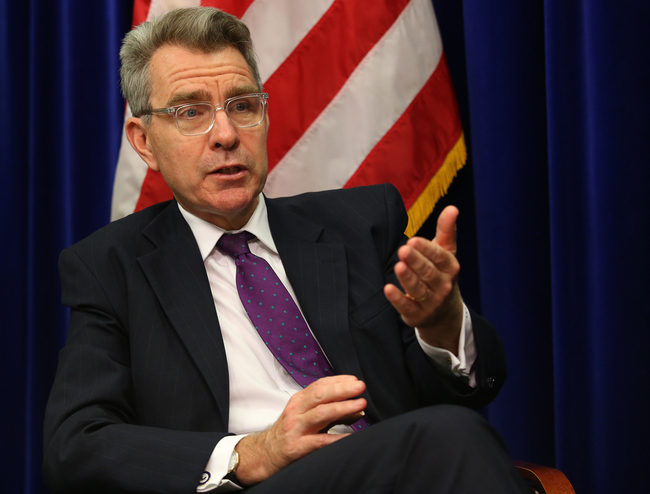
Indeed. The question is have you been able to fulfill them?
“Well, you have achieved energy independence, you have signed the Association agreement, and Ukrainian democracy is stronger today than it’s ever been before. There is still work to be done. It’s a young country still. When I first arrived, in all my speeches I said that Ukraine was only 22 years old. Now Ukraine is only 25 years old. We have 240 years, and look at the challenges that our democracy still faces. So, I think, Ukrainians should be enormously proud of what they’ve accomplished in the past three years. And in the most difficult days in the country’s history, Ukrainians have pulled together, and have made a real progress in building a new country. I will leave here with a profound sense of optimism, but also a great deal of pride for the role the United States has played in standing with the Ukrainian people.”
“WE ARE BOTH COUNTRIES THAT WERE BORN IN A REVOLUTION”
Mr. Ambassador, on the event on the Day of Independence, you mentioned the play Hamilton. Do you see many similarities between Alexander Hamilton’s period in the history of the US and the situation we have now in our country?
“As I said in my remarks on July 4, that period of American history was similar to the period you are facing now. We are both countries that were born in a revolution. Hamilton came to prominence as America made the transition from being a country at war to a country working through difficult issues of development, of taxation. I mentioned his Whiskey Tax, which nobody liked, but it was part of making a financial system in the United Stated that bound our country together. So, the comparison is very apt. It’s how do you go from crisis to building of institutions. Again, I think it’s very much the moment at which Ukraine finds itself in now. You’re building institutions. As I said in one of my interviews at the beginning of 2016, the challenge for this year is to make reforms irreversible, to get to the point when there’s no turning back. I am a hundred percent convinced that there will never be another Yanukovych. This country will not stand for it, the people will not stand for it. The challenge though is to build the kind of enduring institutions, where it does not matter who the president is, or who the prime minister is, but the state functions. And that’s the work for the months and years ahead.”
Many in Ukraine and in the world are very concerned about statements of one of the US presidential candidates, Donald Trump: about NATO that it is obsolete, about Putin, who he called a smart guy for taking a part of Ukraine. Don’t you think that his statements look very similar to Putin’s? What would you say to Ukrainians – should they be worried and concerned?
“I’ll just say two things. First, by law, I don’t comment on American domestic politics, so I’m not going to start with that today. But the other point I would make, which is very important. There is a strong bi-partisan support in the United States in favor of the policy that we have pursued over the past three, two-and-a-half years in response to Russia’s aggression against your country. There is strong Democratic and Republican support for what we’ve been doing here. My confirmation hearing is an illustration of that – the very generous comments that were made about the work the Embassy team has been able to do. I can’t predict the future, but what I can tell you is that as long as Ukraine continues down the path of reform, of building European institutions, of working towards European values, I’m confident that American political leaders will respect and support that.”
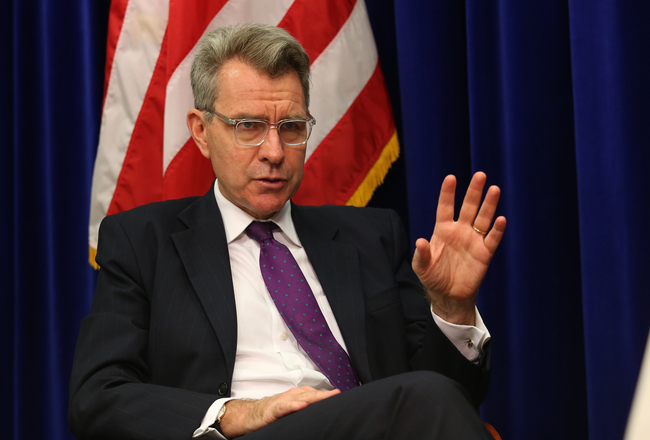
What is the general impression you have about Ukraine, what memories are you going to take with you?
“It’s a really good question and nobody’s asked me that yet, so I don’t have a prepared answer! There have been so many incredible experiences that I’ve had in my time here. It’s hard to think of one that sort of sticks with you more than another. A few days of great sadness but mostly of great happiness. I think I’ll always remember May 25, 2014 – because that was the day of the presidential elections, which many people thought would not happen. And it was a beautiful spring day in Kyiv, I had my election observer card, so I was visiting polling places. And I just remember the enormous pride Ukrainians showed as they reaffirmed their democracy and exercised their sovereign right, and then the dramatic developments that evening – Ambassador Tombinski, Ambassador Weil, and I were invited to the BPP headquarters at the Arsenal for President Poroshenko’s declaration of victory. I remember the drama, whether Yulia Tymoshenko was going to challenge the outcome or not. That will always stick with me.
“I had the honor to be at our Congress when President Poroshenko spoke to a joint session in September 2014, that was an incredible emotional experience, I had tears coming down from my eyes. Because it was such a solemn expression of America’s support for Ukrainian people.
“I’ll always remember climbing the top of Hoverla. It was great and dramatic experience, a fantastic view, the wind, the thunderstorms and everything else.
“I’ll always remember my bicycle races, I’ve done a couple of Sotkas – two Kyiv Sotkas, did the Odesa Sotka. I did a 120-km race that was on a course that was later used by the professionals between Dymer and Sukholuchia. And I’ve made a lot of good friends with my cycling – that’s my sort of secret relief from the office.
“But there were many, many memories. I guess the overall impression that I will take away is of the extraordinary courage and resilience of Ukrainian people. As I’ve said never bet against Ukrainians, because this is a society that has been tested as few others have been, especially in those dark days of 2014. And they prevailed.”
“THAT’S EXACTLY THAT CIVIL SOCIETY THAT MAKES ME SO OPTIMISTIC ABOUT WHERE UKRAINE IS GOING”
What advice will you have for your successor, Marie Yovanovitch?
“I don’t need to give Masha a lot of advice. She knows Ukraine very well, she knows Russia very well, she’s been Ambassador two times before, so I said when I was appearing in Congress, that if I had to look all across our Foreign Service and identify one successor whom I would be honored to hand this office to, then it would be Masha Yovanovitch. So, I’m very excited about it. She’s going to be a terrific ambassador, and both a loyal advocate of American interests in your country, but also someone who you will find a very effective defender of what we are trying to do.
“You know, the one piece of advice that I have given her, as I said, was to never bet against a Ukrainian. Do not overlook the importance of the Ukrainian people. And that’s one of the things that has changed in Ukraine compared to when she was here earlier. You now have an incredibly energized civil society, volunteer organizations – supporting the military, or the police, or veterans – that are active and engaged. That’s exactly that civil society that makes me so optimistic about where Ukraine is going. And I know for Ambassador Yovanovitch, when she gets here, tapping in to that slice of Ukraine will be just as important as working with the government, working with President Poroshenko, Prime Minister Hroisman, and all the ministers. That’s the real story of Ukraine.

“The other thing I will say, because of decentralization, because of how the society is changing – you can’t do this job sitting in Kyiv. The oblasts have become more important, changes are happening. I saw Governor Rainin, we were talking about Kharkiv just last week; I was with Governor Saakashvili just a week before in Odesa. I saw Mayor Sadovy a couple of weeks before that, when he came to our July 4 event.
“That’s part of the real story of Ukraine today, that it’s happening not just in Kyiv, but also in those major oblast centers. Very much like in the United States – you can’t sit in Washington and understand what’s happening in Texas, or Chicago, or Los Angeles in California. The same applies to Ukraine now.”
Can you say something in Ukrainian?
“You know, one of my only regrets in this job is that my Ukrainian never got any good, in part because after all this, after Maidan I didn’t have time to keep up with my tutorial. So I’m going to spare you from that for now.”
To end the interview, what would you like to say to the readers of our newspaper – or, maybe, to every Ukrainian?
“My wish for the Ukrainian people is that they will enjoy the quality of governance that they so richly deserve, that they have worked so hard to achieve over the past two and a half years. It is truly the case that Ukrainian society, the Ukrainian people are more developed than the politicians. And I think the opportunity which Ukraine has seized over the past two and a half years is to begin developing a cadre of political leaders, who’ll live up to the sacrifices and the hard work that the Ukrainian people themselves have demonstrated. I’m sure, as all my predecessors – John Herbst, Steve Pifer, Bill Miller, they are all regulars back here in Kyiv – I very much hope to come back at some point as well. But what I really hope to do is come back to Crimea when it returns to Ukraine. And one of my other regrets – I got to Crimea twice: I went there almost exactly three years ago today to meet President Yanukovych to present my credentials. And I was there for the Yalta conference. And I remember on both of these trips I said to myself: I really need to bring my bike next time, because this would be a great place to go cycling. And unfortunately I didn’t anticipate what President Putin was going to do to derail that plan – but we’ll keep working on that. The other thing that was on my list which I never got to do – I never got to see a Shakhtar match at Donbas Arena, and that’s also very much on my list. And both of those depend on Mr. Putin.”








